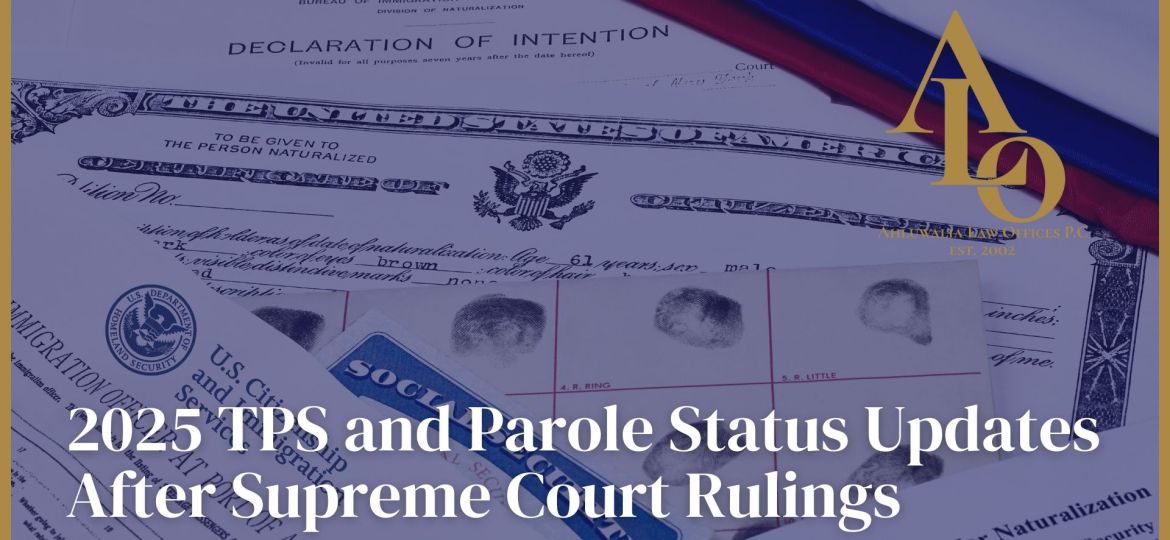
In light of multiple federal court decisions through mid and late 2025, several Temporary Protected Status (TPS) and parole programs have seen significant changes. The following summary consolidates key information from the U.S. Department of Homeland Security (DHS) and U.S. Citizenship and Immigration Services (USCIS) as of October 6, 2025, to help employers and foreign nationals understand the current legal landscape.
CHNV Parole (Cuba, Haiti, Nicaragua, Venezuela)
The CHNV Parole Program was terminated following a Supreme Court ruling on May 30, 2025. As a result, beneficiaries under this program may face deportation proceedings unless they secure an alternative legal status, such as asylum, family-based adjustment, or employment-based visa categories. Employers should verify ongoing employment authorization validity under DHS guidance.
Uniting for Ukraine (U4U)
The Uniting for Ukraine parole remains active, although USCIS has paused new Form I-134A submissions as of January 20, 2025. Beneficiaries who were already approved continue to retain parole status. However, future program viability remains under review by DHS per the Executive Order Securing Our Borders.
Afghan Parole and Military Parole in Place
Both Afghan parole programs and Military Parole in Place remain active. No new restrictions have been announced. Afghan nationals and qualifying military family members should continue monitoring official USCIS notices for updates or extension announcements.
Temporary Protected Status (TPS) Overview
As of October 2025, the USCIS TPS webpage and related Federal Register Notices confirm several terminations and extensions across multiple countries. Below is a high-level overview:
| Country | Status | Key Notes |
|---|---|---|
| Afghanistan | Terminated | Effective through July 14, 2025 |
| Burma (Myanmar) | Active | Designated through Nov. 25, 2025; EADs auto-extended through May 25, 2025 |
| Cameroon | Terminated | Effective through Aug. 4, 2025 |
| El Salvador | Extended | Valid through Sept. 9, 2026; EADs auto-extended through Mar. 9, 2026 |
| Ethiopia | Active | Designated through Dec. 12, 2025; EADs valid through Dec. 12, 2025 |
| Haiti | Terminated/Reinstated | District Court reinstated TPS effective through Feb. 3, 2026 |
| Honduras | Terminated | Termination proceeding after 9th Cir. stay; valid through Sept. 8, 2025 |
| Lebanon | Active | Designated through May 27, 2026 |
| Nepal | Terminated | Valid through Aug. 20, 2025; termination allowed by 9th Cir. |
| Nicaragua | Terminated | Termination proceeding pending appeal; valid through Sept. 8, 2025 |
| South Sudan | Extended | Extended through Nov. 3, 2025; EADs auto-extended |
| Sudan | Extended | Extended through Oct. 19, 2026 |
| Syria | Terminated | Effective through Nov. 21, 2025 |
| Ukraine | Active | Designated through Oct. 19, 2026; EADs auto-extended through Apr. 19, 2026 |
| Venezuela (2021/2023) | Terminated/Restored | Litigation allows limited continuation through Oct. 2, 2026 |
| Yemen | Active | Designated through Mar. 3, 2026; EADs auto-extended through Sept. 3, 2025 |
Venezuela TPS: Complex Dual Designation Litigation
The Venezuela 2021 and 2023 TPS designations are currently under dual judicial oversight.
- 2021 TPS holders who did not re-register under the January 17, 2025 notice may continue to show work authorization through November 7, 2025.
- 2023 TPS holders and those who re-registered under the 2021 extension may remain valid through October 2, 2026, with EADs auto-extended for up to 540 days when renewal applications were timely filed.
Employers are reminded that, according to the U.S. Department of Justice, Immigrant and Employee Rights Section, they may not require Form I-821 as proof of re-registration but may confirm work authorization expiration dates.
Employer and Beneficiary Guidance
- Employers should continue to rely on the USCIS TPS webpage for confirmation of current EAD validity and auto-extension dates.
- Beneficiaries should ensure they have timely re-registered for their country’s TPS designation and filed EAD renewals where applicable.
- Legal counsel can assist with exploring adjustment, humanitarian, or employment-based options as terminations take effect.


